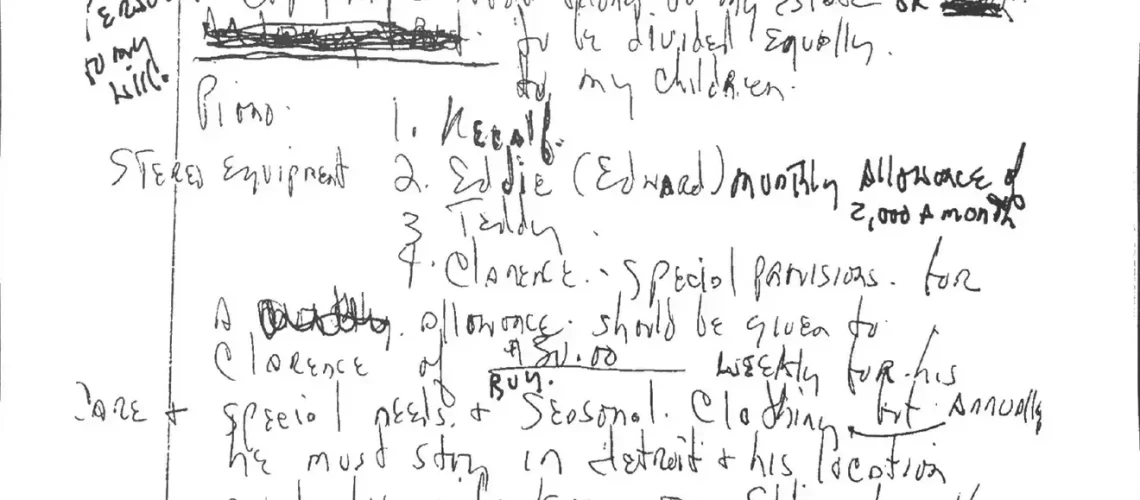As an estate planning attorney, I often have clients or their family members ask me about handwritten wills. Some of the questions, I have been asked have been:
“My father left a signed piece of paper stating what he wanted to happen to his estate after he passed away; we can file this with the court as his will, right? It’s notarized.”
“My mother executed a will, but there’s a handwritten piece of paper she attached to it with some changes she wanted to make to it. Those changes are valid, right?”
“I’m about to get on a plane, can I just handwrite a short will to have something in place until I come back and execute my full will with you?”
In talking with these clients or their family members, I understand that these questions are coming from a place of wanting to make sure a loved ones wishes, or their own wishes, are honored upon their passing; however, there can be an inherent danger to allowing a handwritten will. Because of the importance of protecting an individual’s estate and testamentary wishes by ensuring that someone doesn’t forge a writing and pass it off as a decedent’s Last Will and Testament, there are certain formalities that must be followed for a will to be valid.
New York State law has certain statutory requirements that must be met in order to make a valid Last Will and Testament that can be admitted to probate. These requirements are outlined in New York Estates, Powers and Trusts Law (EPTL), Section 3-2.1 and include the following:
- Signature: Either the testator shall sign his or her name at the end of the will, or, the will may be signed by another person at the testator’s direction and in the testator’s presence.
- Witnesses: The testator must sign the will in the presence of at least two witnesses or the testator must acknowledge to each of the witnesses that the will was signed by him or her or at his or her direction. The two witnesses then shall each sign the will within 30 days of the testator signing and provide their addresses on the will.
- Declaration: The testator shall declare to each of the witnesses that the document being executed is his or her will.
There is no requirement that the will be typewritten, the will can in fact be handwritten as long as the above requirements be satisfied. Additionally, there is no requirement that a will be notarized; however, witness signatures are typically notarized on a self-proving affidavit that is attached to the will. The self-proving affidavit allows the witnesses to attest to the circumstances regarding the testator’s capacity and whether the required formalities were followed during the execution ceremony. If a self-proving affidavit is not attached to the will, the witnesses will have to attest to these facts at the time of the testator’s will being probated.
As noted above, if a will meets the above formalities, then it is considered a valid will. With that said, a handwritten will that does not meet the requirements of EPTL Section 3-2.1 could be considered valid if it was drafted and executed under certain circumstances. Such a will is known as a holographic will and it is an exception to the rules outlined above. Because society has an interest in making sure there are no fraudulent wills, a holographic will is only valid in extremely limited circumstances.
A holographic will is a will that is completely handwritten by the testator and has no witnesses. Pursuant to EPTL Section 3-2.2 (b), this type of will is “valid only if made by:
- A member of the armed forces of the United States while in actual military or naval service during a war, declared or undeclared, or other armed conflict in which members of the armed forces are engaged.
- A person who serves with or accompanies an armed force engaged in actual military or naval service during such war or other armed conflict.
- A mariner while at sea.”
If the holographic will is made by a testator who falls into categories (1) or (2) above, the will becomes invalid after one year of the testator being discharged or ceasing service with the armed forces. If it is made by a testator who falls into category (3), then the will becomes invalid after three years from when the will was made.
As you can see there are very limited circumstances where a handwritten and unwitnessed will is acceptable and valid and for good reason. Because while it may be easier to jot down your wishes on a napkin and sign it, it is important that a greedy heir not be able to completely alter an individual’s wishes with a fraudulent handwritten will after they pass away. New York State’s statutory requirements help protect a testator’s wishes and ensure that an estate someone has worked his or her whole life to accumulate is distributed in accordance with his or her wishes.
If you would like to discuss your estate plan, please contact the trust and estates team at Laidlaw & Simon.













